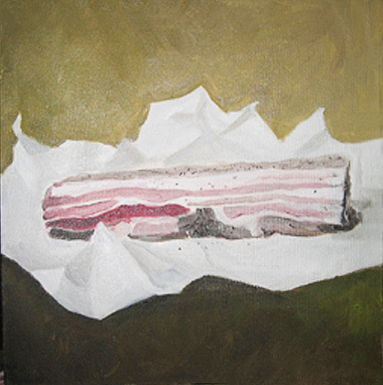Porc or Porque?
My friend Nicola, author, literary researcher and member of the professional food writers’ forum called Eatwords, (we call ourselves EatWorders), asked a food-related question yesterday…
“Help, please, literati… I have been given a manuscript to read. It’s a food history book, and is written in US. The author discusses French and Anglo Saxon food words and refers to ‘porque’. I have never seen it written anything other than ‘porc’ in French, but is this some obscure historical way of spelling it? Or has the author simply made a gaffe, perhaps by confusing it with the Spanish word for ‘because’?”
Living in a part of France where local accent has a distinct Spanish twang, I found that this question presented a challenge…
Here in the deep South of France, we pronounce all our T‘s and S‘s and even our silent E‘s at the end of a word. And goodness, it is so easy to do when you’re here a while. Thus, Mirepeisset (the name of our village) is pronounced ‘Mirepeissette‘, neighbouring Argeliers is pronounced as ‘Argeliesse, as is Ginestasse (Ginestas). Even the word moins (as in ‘less’) is pronounced with its final S well articulated. We also say ‘paing‘ and ‘vang‘ and ‘veng‘ instead of pain, and vent and vin…
This is partly due to the proximity of Spain and partly because a large part of the local inhabitants are from Spanish descent (having arrived here as migrant grape-pickers during the early part of the last century). And this accent stretches from Perpignan to Carcassonne and from Toulouse to Provence (you only need to listen to Yves Montand’s delicious diction in Pagnol’s Jean de Fleurette and Manon des Sources).
Since it is a wonderfully balmy and star-lit evening, and the little restaurant in the square is still buzzing with the influx of diners, I thought I would pop out to the Placette and ask for an informed opinion from the benches.. The subject of ‘porque‘ or porc after all plays a very important role in people’s lives and daily diet here. For who could possibly survive without the salted and heavily peppered cansalada (more commonly known as petit salé)?
Our (by now famous – see earlier posts) 20 odd batchelors are out in force tonight – occupying every public bench in sight. Some are even seen ‘mingling’ with a Parisian, a Bordelais and a Lyonnais that have descended for their annual holidays. I approached one such little group and when there was a brief gap in the conversation, I posed Nicola’s question… It was like throwing a cat among the pigeons (or rather jeter the undisputed pavé dans la mare). From the ensuing cacophony I retrieved the following comments…
– “Ah beng NONG (local accent), “le porc c’est le porc” (no audible pronunciation of the final c). “There’s nothing more to it”.
– “Ah si“, (nasal Parisian accent – not too popular here because of its implied haughtiness), “j’ai entendu, bien que très rarement, la prononciation ‘porque’ ici dans le Sud”. This is vividly and noisily contradicted by the locals.
– “Mois aussi” (pipes up a Lyonnais accent – even less adored here because of its self-assigned and presumed superiority) “j’ai entendu les gens d’ici dire ‘porque’…” (Surrounded by so much local talent, he dared not call us ‘natives’ or ‘ploucs‘ and so described the locals more politically-correct as ‘people from here’.) Bad mistake. Naturally his opinion was completely drowned in a waterfall of passionate disapprovals. These protests were issued on principle, for what do these ‘foreigners’ know about our accents anyway? And how dare they have an opinion on a subject as close to our hearts (and stomachs) as pork?
– A Bordelais, unaware of the perils, joins in. (Being from Bordeaux, he’s an obvious target too – don’t they sell wines over there that, whilst being totally inferior to our own sublime Languedoc specimens, they have the culot to charge more for? And doesn’t that make them even more fair game than Parisians or Lyonnais? “Moi aussi” he ventures hesitantly, “j’ai entendu porque des bouches fleurantes du terroir…” which translated means ‘I have also heard porque from mouths with accents that are perfumed by the land‘.
Dead silence in the square.
That was it. Nobody said a word. And nobody had an answer to that. I’ve put my foot in it with this question and well I know it. We’re not just talking about a cat among the pigeons here. More like un loup dans la bergerie!
Undecided and confused, I retreat. Nothing more needs to be said and tomorrow is another (sunny) day. My soft-talking sweet neighbour Serge takes pity on me and gentlemanly catches my elbow. He volunteers that ‘the mountain people’ from the Ariege mountains, in the foothills of the Pyrenees, sometimes say porque with the final Q well pronounced. And then confesses that if a woman would eat messily and spills her food (or wine), she COULD say: “je fais la porque” – as in: I eat like a pig.
There you have it. porque versus porc. I now need a good shot of something strong to calm my nerves…
Published august 2010

